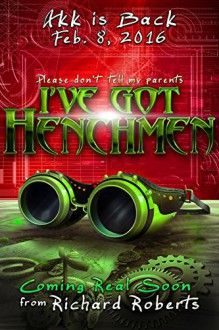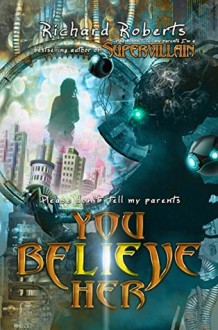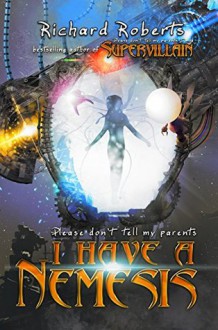
[I received a copy of this book from the publisher, in exchange for an honest review.]
I have been following this series from its first volume, which I really liked, so I'll admit to being slightly biased. I like the main characters, the world of superheroes and villains developed here—everybody knows they exist, with more or less admiration and acceptance of what they do, and with a subverted Masquerade trope (supers don't hide per se, but there's an unspoken rule about “not getting personal”, that is, not revealing people's day-to-day identities).
And I'm feeling torn, because I liked this third volume, yet also found it kind of weak in terms of plot. Perhaps because it's more focused on a part of Penny et al.'s life we hadn't really seen yet, that is, growing up, and finding out that dividing one's life between villainous activities, trying to become a hero, and just good old norma activities, is time-consuming and difficult.
In that regard, it was interesting. Other kids are making their coming out, refusing to hide their powers any longer, and a wind of acceptance is blowing over the school. The club activities, the new lair, those were both fun to read about, and also leading to more thoughtful considerations.
I quite liked Marcia's development, although I wish we had been given some more information about how exactly she turned out like that (“she has the scrolls” is a bit of a shortcut: how did she survive them?). Her powers are of a kind that I find fascinating, that is, would you stay sane if nothing could hurt you, or not for long? Or would you start experimenting, looking for the one thing that may do you harm? It made me think of Claire's experiments at the beginning of the “Heroes” series, only in a more.. unhealthy way. But then, I much prefer this Marcia to theuppity girl from book 1.
Quite a few things that left me frustrated, though:
- This is really more a “slice of life” book, without any real plot apart from the loose “teenagers gathering and developing their powers”. As mentioned above, it allowed to delve deeper into our three wannabe-heroes (or wannabe-villains?) problems and potential choices for the future, and to reveal more about existing characters, like Bull and his family. On the other hand, there was no real main plot here, ideas would spring up and unfurl into short events that would then die down, and good plot devices were lost in the middle. What about the robot? (Having her around more would've been fun... and I think we could do with a new Vera by now.) What exactly happened to Barbara to make her another kind of unpredictable, but perhaps still as dangerous as her sister? Also, we're having many secondary characters introduced (the club) and this is screen time may have been better used on the Inscrutable Machine (who didn't do enough villainy to my liking—I want to see them dostuff back together more often!).
- Still no real insight as to Ray's family, which makes his position hard to relate to: it seems his parents would hate him if they were to learn he's a super, and so he both wants to stay and to leave... but that's only what we're told. We never get to see his family. We don't know what they're like. Regular people, from what I rememberfrom book 1... or not so much? Are they heroes or villains in disguise? Or maybe people who got badly hurt in the past by some hero or villain, and now they despise everything “super”? I really, really want to know, and I really hope there's more to Ray's folks than the little we'vebeen told so far. It can't be so simple. And if it has to be “that bad”, then I want to see it, too.
- Are the Akks so blind as to their daughter's activities? Or are they pretending not to know? Deluding themselves? By now, this is more than troublesome. Maybe Penny's father might get away with this (scientist more focused on his own inventions, and all that), but it's difficult to keep seeing the Audit as this calculating, probabilities- and statistics-wielding ex-hero, as this sort of human computer, when she's so oblivious to what's so obvious. The “bumbling blind adult” trope isn't working.
Honestly, I don't like giving less than 3 stars to this book. But...
Nevertheless, this novel raises some interesting questions and potential future arcs at the end, and I'd still want to see those in a next installment, if it meant more antics from the trio. Among other things: what is the Inscrutable Machine to do, to choose, considering that they seem to be really talented at villainous stuff (with the good deeds backfiring), yet still find themselves instinctively helping people as well as causing mayhem? And what is Spider up to?


 Log in with Facebook
Log in with Facebook 









